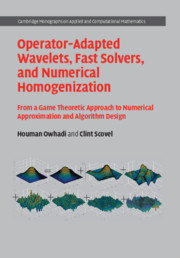 Operator-Adapted Wavelets, Fast Solvers, and Numerical Homogenization
Operator-Adapted Wavelets, Fast Solvers, and Numerical Homogenization Book contents
- Frontmatter
- Dedication
- Contents
- Preface
- Acknowledgements
- Reading Guide
- 1 Introduction
- Part I The Sobolev Space Setting
- Part II The Game Theoretic Approach
- Part III The Banach Space Setting
- Part IV Game Theoretic Approach on Banach Spaces
- Part V Applications, Developments, and Open Problems
- Part VI Appendix
- Bibliography
- Algorithms
- Glossary
- Nomenclature
- Index
- Identities
1 - Introduction
Published online by Cambridge University Press: 10 October 2019
- Frontmatter
- Dedication
- Contents
- Preface
- Acknowledgements
- Reading Guide
- 1 Introduction
- Part I The Sobolev Space Setting
- Part II The Game Theoretic Approach
- Part III The Banach Space Setting
- Part IV Game Theoretic Approach on Banach Spaces
- Part V Applications, Developments, and Open Problems
- Part VI Appendix
- Bibliography
- Algorithms
- Glossary
- Nomenclature
- Index
- Identities
Summary
The introduction reviews, summarizes, and illustrates fundamental connections among Bayesian inference, numerical quadrature, Gausssian process regression, polyharmonic splines, information-based complexity, optimal recovery, and game theory that form the basis for the book. This is followed by describing a sample of the results derived from these interplays; including those in numerical homogenization, operator-adapted wavelets, fast solvers, and Gaussian process regression. It finishes with an outline of the structure of the book.
Keywords
- Type
- Chapter
- Information
- Operator-Adapted Wavelets, Fast Solvers, and Numerical HomogenizationFrom a Game Theoretic Approach to Numerical Approximation and Algorithm Design, pp. 1 - 22Publisher: Cambridge University PressPrint publication year: 2019
